“I’ve almost lost my life a few times, so I’m determined to tick off my goals” – Bree’s story

I’m currently in hospital and it’s a bit of a waiting game.
All my other treatments have failed. I’m on steroids to control my inflammation, but we’re heading towards a permanent stoma. I’ve just started on this new drug, RINVOQ, which I’ve been on for about a week. They’re deciding whether to give it more time to work, but I’m at risk of my bowel perforating because the ulcers are quite deep in my small intestines. They don’t really know what they’re going to do as we’ve almost exhausted every option. The question is whether to have the permanent stoma surgery sooner rather than later, or if I try everything I can while facing an elevated risk of peritonitis, and other life-threatening complications.
I was initially diagnosed with ulcerative colitis in 2012.
I went in to get an endoscopy for coeliac disease, and they saw that the UC was quite bad. I was in hospital for about a month, and on steroids to try control the inflammation. From there, they started me on the immunosuppressants, but nothing seemed to work. At 14, I had no choice. The medical team sat me down and said that I’d need an ileostomy ASAP. They removed my colon, which was inflamed. It was daunting being told that when I was so young. But, as soon as I had the ileostomy, I felt that I had my life back. I woke up early in the morning because I had energy, I was playing sport, and I wasn’t on the toilet all night. It was good, but I said to the surgeons, “I’m 13 years old, I don’t want this stoma forever.”
They promised me a stoma reversal about three months post op, which is what happened. Following that reversal, I faced several complications. They put me back on immunosuppressants as I was diagnosed with Pouchitis and very sick all the time. Any infection that was going around, I’d catch, and I’d end up septic. I also had peritonitis, which led to emergency surgery. They told me that the inflammation was spreading up into my small bowel, which resulted in a diagnosis of Crohn’s Disease as well. The only thing that worked for a time was infliximab but, following my second infusion, I had an anaphylactic reaction. Over the years, I’ve been on and off immunosuppressants, steroids and antibiotics without much success.
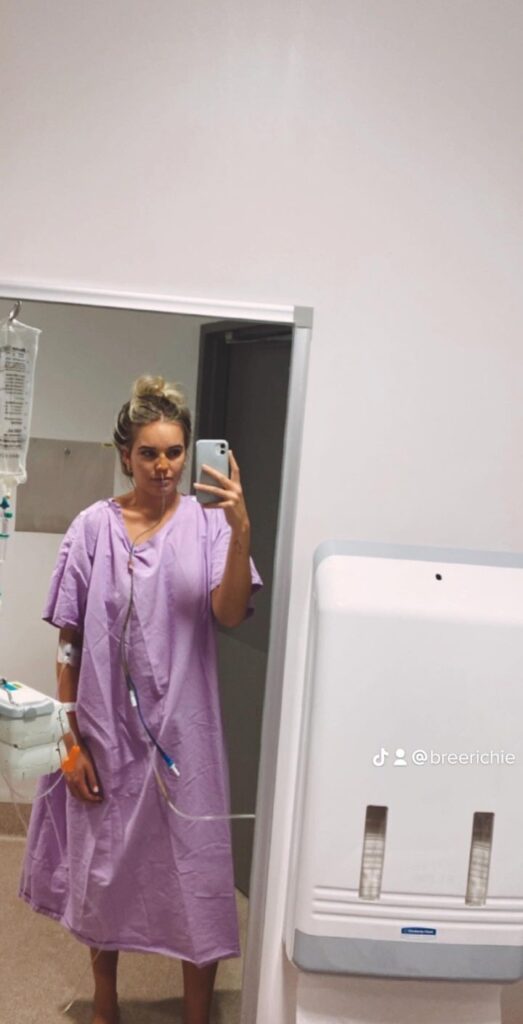
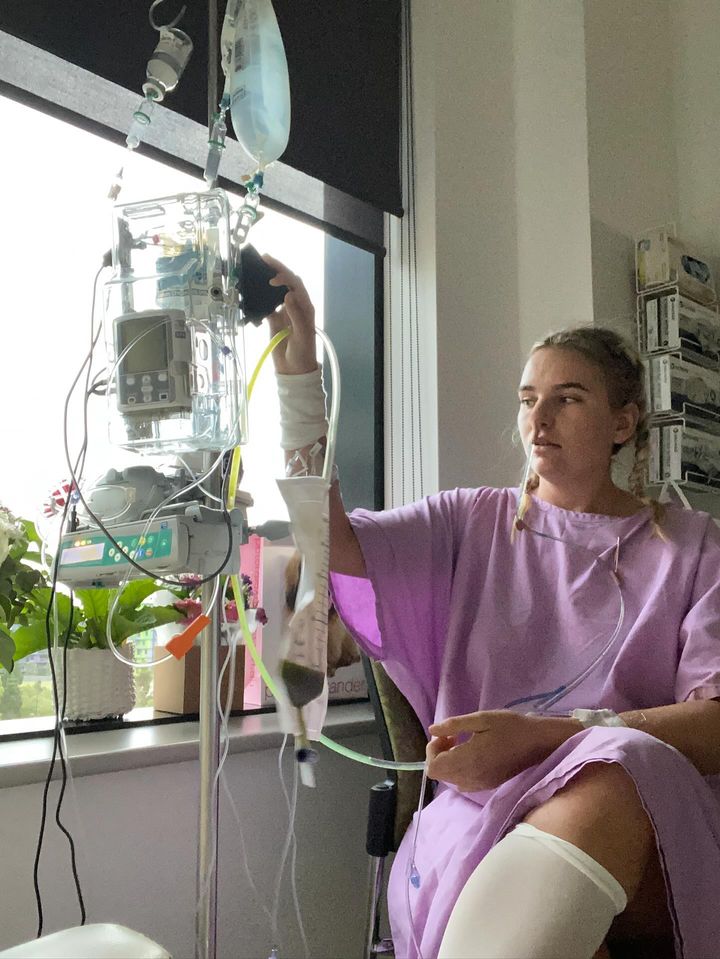
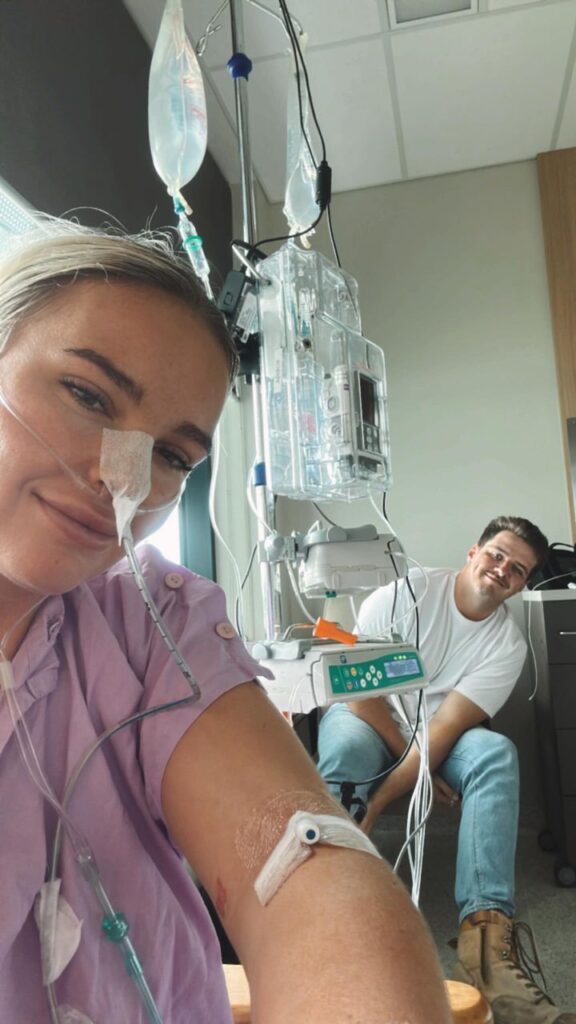
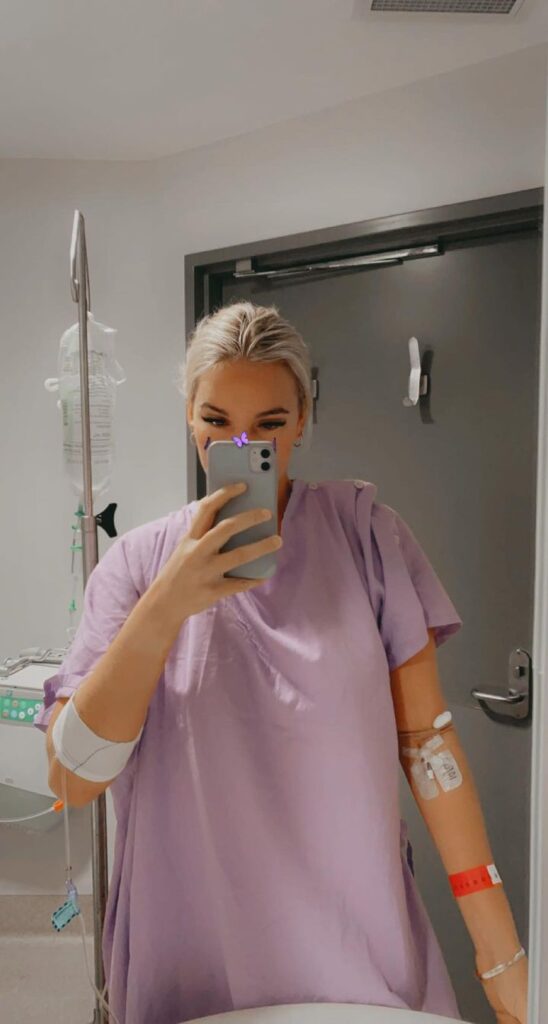
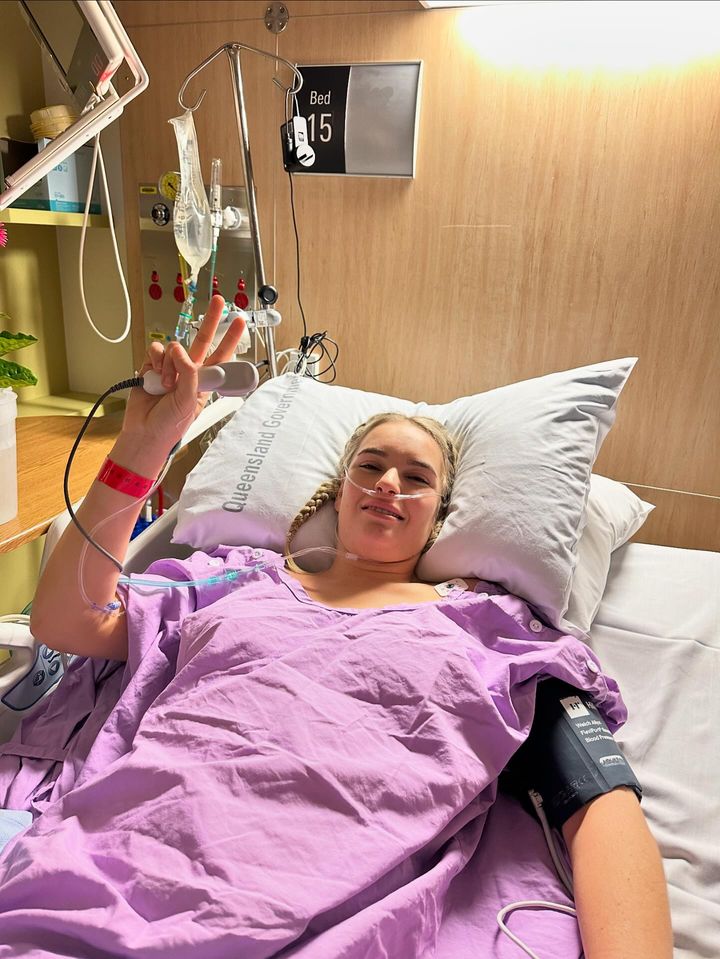
By the end of 2022, I was told that I’d need a permanent stoma.
I was 23, and it was very challenging to be told that. I argued with my surgeons, who gave me the option of an ileostomy which could be reversed. I got the stoma the next year, and I felt like I had my life back again. But, during that period, I experienced five bowel obstructions. They made the stoma too small. I ended having to call a Ryan’s Rule. It wasn’t until I was vomiting up my own fecal matter that my mum said, “this isn’t right.”
I’m a registered nurse and work in ED. I knew I was having a bowel obstruction, but no one would believe me. I felt so trapped and isolated, and I wondered whether I was going crazy. Following the Ryan’s Rule, they organised an x-ray of my stomach. It showed a massive bowel obstruction. My surgeons and specialists were white as a ghost and apologised for not listening to me.
From there, I was in so much pain that I had bilateral pleural effusions on my lungs. I couldn’t breathe properly. Again, I became septic. All my numbers were out of control. My blood pressure was super low, my heart rate was up, I had a temperature. The nurses weren’t escalating the situation. I was experiencing delirium and seeing things, but the nurses didn’t respond to what was happening. My mum had to call another Ryan’s Rule because of how sick I was. They were going to place me in ICU, but I was treated in the ward and eventually discharged.
A week later, I had another bowel obstruction. I had to come back to the hospital and have the stoma revised because the stoma was again too small. That worked out, and I was doing really well until about February this year. CT scans and MRIs showed that I had endometriosis, which caused another bowel obstruction. I was rushed straight to theatre at the hospital where I work because I was so sick. They figured out that the endometriosis was causing the bowel obstruction. They facilitated the stoma reversal while the endometriosis was removed.
Over the past few months, I’ve been doing well. I play AFL, I’ve been working in Emergency, I’ve been overseas a few times and I’ve been living my life. But, during the past month, I’ve been flaring up again. Two weeks ago, I had a scope, and was told that the results were horrendous. That’s when I started on RINVOQ. I had a stool test and blood tests done, and my inflammation markers were out of control. They told me to come in ASAP. I had another scope, and they saw the ulcers everywhere.
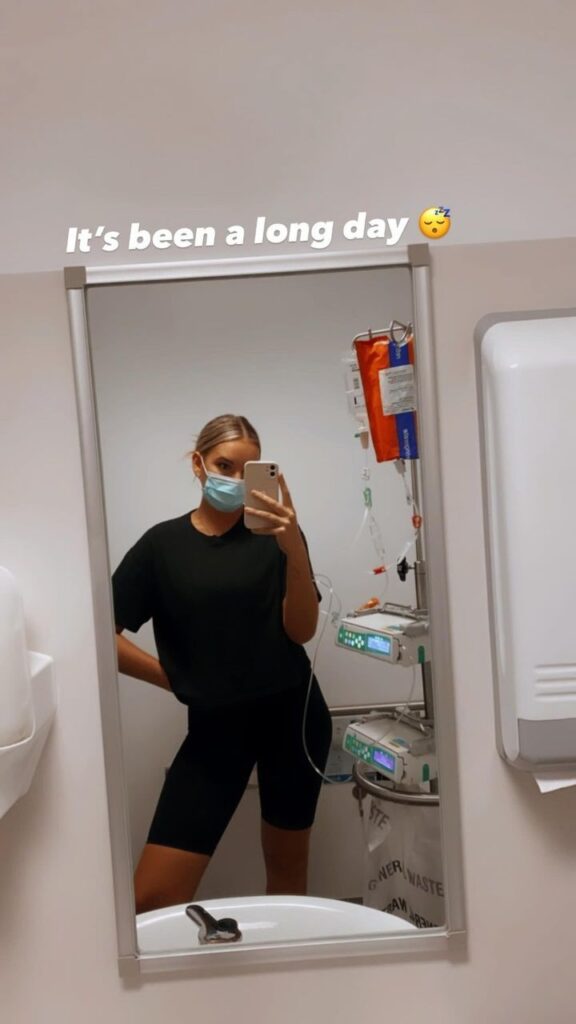
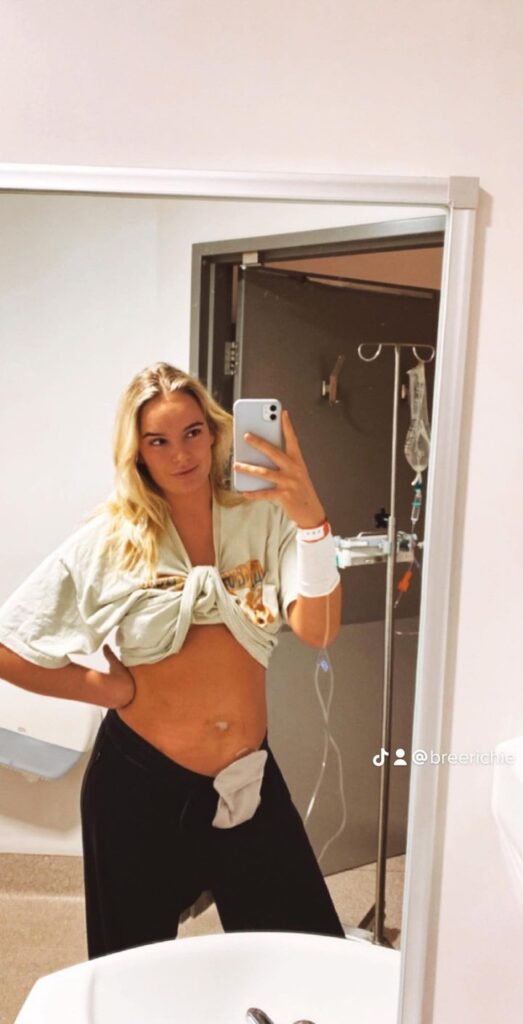
I don’t really let this stop me.
At night it gets quite bad, and I might be crying in pain, but I’ve been soldiering on. My specialist has said to me that getting a bachelor’s degree as well as two postgraduate degrees is unreal. Not many people can persist with the level of pain that can come from Inflammatory Bowel Disease. I think it has made me a more resilient person. I’ve almost lost my life a few times, so I’m determined to tick off my goals. You never know what the next day will bring, and there’s extra motivation to live every day to its fullest.
Fortunately, I have a lot of great friends. My parents have been really supportive, as has my boyfriend. Despite this, I still feel quite isolated because it’s a monumental thing to go through. They try to understand, but it’s so hard unless you’re actually going through it. I have a few friends that I’ve met online, like Jordan from South Australia, and Isabel in Melbourne. They’ve both been through it. We all talk, and it’s good to have them as part of my support network. It’s also why I like to share my story. It creates a sense of awareness, and other people feel more comfortable reaching out with their own experiences.

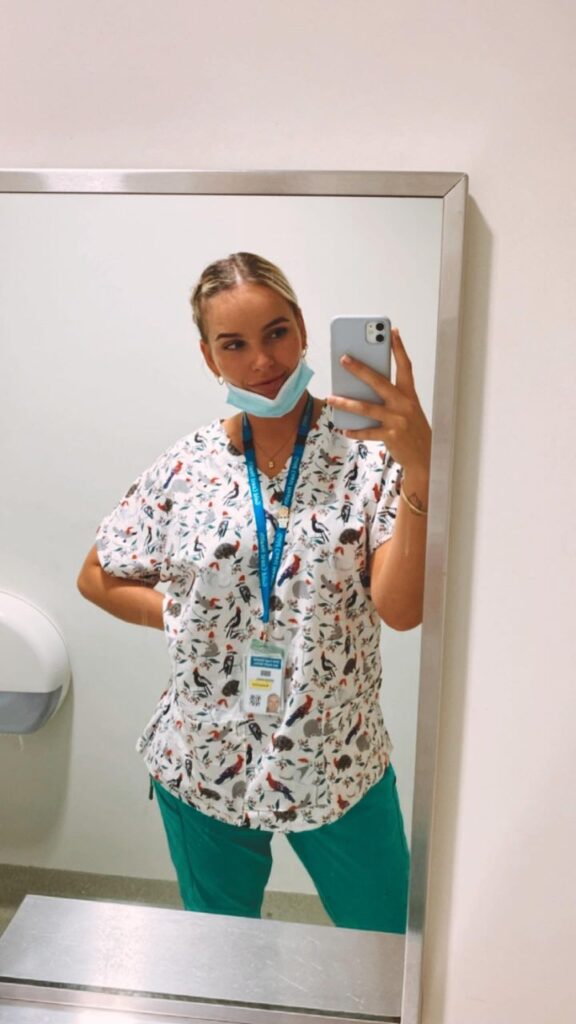




While I’ve been sick, I’ve had good and bad nurses.
I’ve had nurses who care heaps, and some who haven’t cared at all. It motivates me to be one of the nurses that people remember. Through my life experiences, I can sympathise with my patients. A lot of them have come through with Crohn’s Disease or colitis. I can tell them that I know what it’s like. It creates rapport and trust. I will always, always advocate for my patients. It’s why I love working in Emergency. It’s very nurse led. I can escalate things and do what I think is right for my patients.
I’m usually a person who is unstoppable. I’m always studying, working, going to the gym, playing sport and so on. My flare up stops me a little bit, which is frustrating, but I’m trying to take each day as it comes. Dwelling on the future can cause more stress and anxiety. I’m working with the team – who are listening to me – and I know that everything will work out.
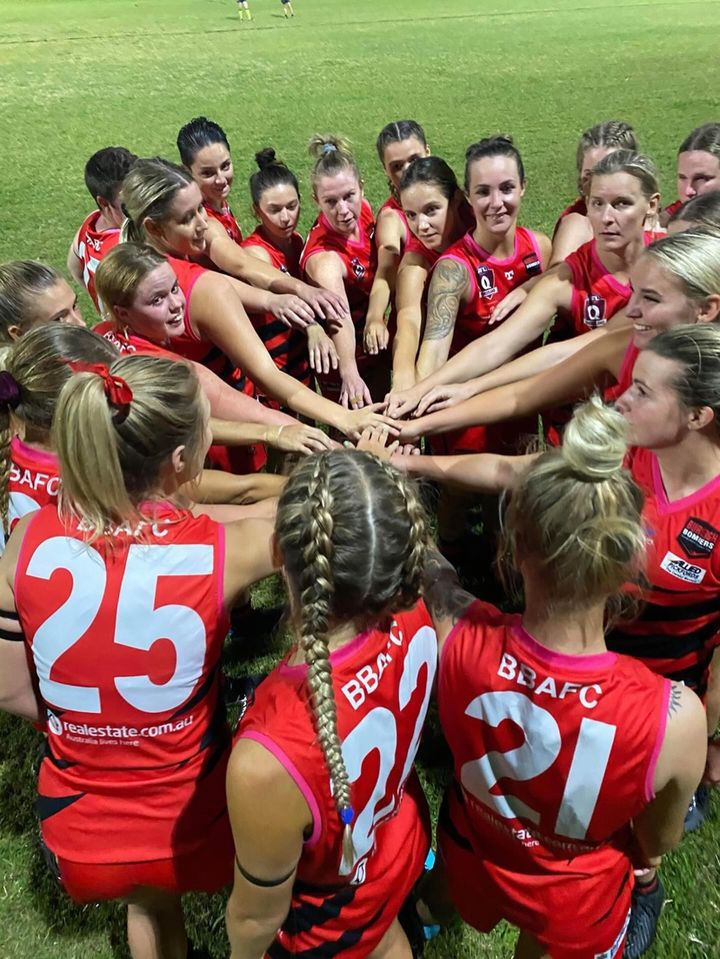
Click here to share your own story.
Postscript: “It looks like I’ll be having surgery for a permanent stoma in the next few days which is unfortunate, but I know that I’ll have my life back again”
Update (11/9/2024)

Update 2: 15/11/2024
For most of my life, I took everyday normalcy for granted—going to work, enjoying time with family, and being able to move through the day without thinking twice. But that all changed after I had surgery for a permanent stoma, necessary due to ongoing health issues. What followed was two months of complications, including 2-3 bowel obstructions every day, which left me bedridden, fragile, and losing nearly 15 kilograms. I was hooked up to a ketamine/morphine PCA for pain management, had an NG tube to help with drainage, and a PICC line for TPN (Total Parenteral Nutrition) to survive. Despite the constant pain and setbacks, I kept telling myself: it couldn’t get worse.
When I was finally cleared to leave the hospital, I made the bold decision to go to Europe—just days before my scheduled departure. Though I was weak and still recovering, the change of environment felt like a lifeline. Slowly, I reintroduced food back into my diet and, with time, started regaining my strength. I was able to return to my routine of work, walking, and even doing Pilates again. Looking back, I realize how much I had missed the simplicity of normal life. “It’s not until it’s taken away from you that you truly understand its value.”
This experience has reshaped the way I approach life. It’s not just about surviving, but about truly living. I’ve learned to appreciate every small victory and to live with an overwhelming sense of gratitude. Life is fragile and unpredictable, but every day, every moment of health, is a precious gift.